Related Research Articles
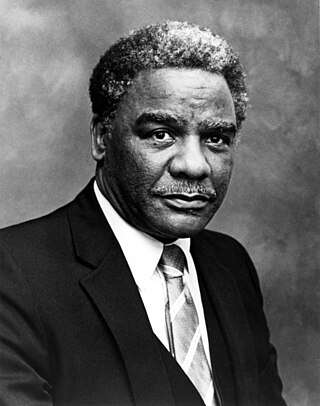
Harold Lee Washington was an American lawyer and politician who was the 51st Mayor of Chicago. Washington became the first African American to be elected as the city's mayor in April 1983. He served as mayor from April 29, 1983, until his death on November 25, 1987. Born in Chicago and raised in the Bronzeville neighborhood, Washington became involved in local 3rd Ward politics under Chicago Alderman and future Congressman Ralph Metcalfe after graduating from Roosevelt University and Northwestern University School of Law. Washington was a member of the U.S. House of Representatives from 1981 to 1983, representing Illinois's first district. Washington had previously served in the Illinois State Senate and the Illinois House of Representatives from 1965 until 1976.

The Chicago Police Department (CPD) is the primary law enforcement agency of the city of Chicago, Illinois, United States, under the jurisdiction of the Chicago City Council. It is the second-largest municipal police department in the United States, behind the New York City Police Department. As of 2022 CPD had 11,710 sworn officers on duty, and in 2020 had over 948 other employees. Tracing its roots to 1835, the Chicago Police Department is one of the oldest modern police departments in the world.
Problem-oriented policing (POP), coined by University of Wisconsin–Madison professor Herman Goldstein, is a policing strategy that involves the identification and analysis of specific crime and disorder problems, in order to develop effective response strategies. POP requires police to identify and target underlying problems that can lead to crime. Goldstein suggested it as an improvement on the reactive, incident-driven "standard model of policing".

The Moorish Science Temple of America is an American national and religious organization founded by Noble Drew Ali in the early 20th century. He based it on the premise that African Americans are descendants of the Moabites and thus are "Moorish" by nationality, and Islamic by faith. Ali put together elements of major traditions to develop a message of personal transformation through historical education, racial pride, and spiritual uplift. His doctrine was also intended to provide African Americans with a sense of identity in the world and to promote civic involvement.
A Terry stop in the United States allows the police to briefly detain a person based on reasonable suspicion of involvement in criminal activity. Reasonable suspicion is a lower standard than probable cause which is needed for arrest. When police stop and search a pedestrian, this is commonly known as a stop and frisk. When police stop an automobile, this is known as a traffic stop. If the police stop a motor vehicle on minor infringements in order to investigate other suspected criminal activity, this is known as a pretextual stop. Additional rules apply to stops that occur on a bus.

As of 2020, more than 800,000 sworn law enforcement officers have been serving in the United States. About 137,000 of those officers work for federal law enforcement agencies.
Orlando Winfield Wilson, also known as O. W. Wilson, was an American police officer, later becoming a leader in policing along with authoring several books on policing. Wilson served as Superintendent of the Chicago Police Department, chief of police in Fullerton, California and Wichita, Kansas.

Frisking is a search of a person's outer clothing wherein a person runs their hands along the outer garments of another to detect any concealed weapons or objects.
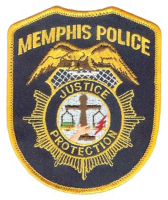
The Memphis Police Department is a law enforcement agency in Tennessee in the United States.
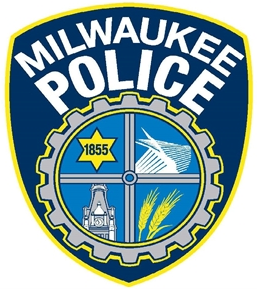
The Milwaukee Police Department is the police department organized under the city of Milwaukee, Wisconsin. The department has a contingent of about 1,800 sworn officers when at full strength and is divided into seven districts. Jeffrey B. Norman is the current chief of police, serving since December 2020.
Donald D. Pomerleau was the commissioner of the Baltimore Police Department from 1966 to 1981.
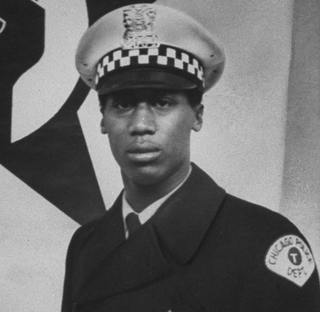
Renault Alvin Robinson was an American police officer who served at the Chicago Police Department from 1964 to 1983. Robinson served as chairman of the Chicago Housing Authority under the leadership of former Chicago Mayor Harold Washington from August 1983 until January 1987. He was most known for founding the African American Patrolman's League. During his career as a police officer, Robinson was responsible for bringing a civil rights lawsuit against the Chicago Police Department for discrimination against minorities.
The Rainbow Coalition was an antiracist, anticlass multicultural movement founded April 4, 1969 in Chicago, Illinois by Fred Hampton of the Black Panther Party, along with William "Preacherman" Fesperman of the Young Patriots Organization and José Cha Cha Jiménez, founder of the Young Lords. It was the first of several 20th century black-led organizations to use the "rainbow coalition" concept.
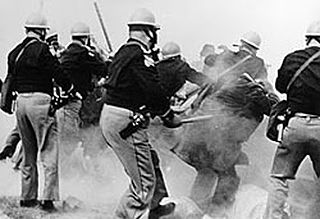
Police brutality is the repression by personnel affiliated with law enforcement when dealing with suspects and civilians. The term is also applied to abuses by "corrections" personnel in municipal, state, and federal prison camps, including military prisons.

Community policing or community-oriented policing (COP) is a strategy of policing that focuses on developing relationships with community members. It is a philosophy of full-service policing that is highly personal, where an officer patrols the same area for an extended time and develops a partnership with citizens to collaboratively identify and solve problems.
The stop-question-and-frisk program, or stop-and-frisk, in New York City, is a New York City Police Department (NYPD) practice of temporarily detaining, questioning, and at times searching civilians and suspects on the street for weapons and other contraband. This is what is known in other places in the United States as the Terry stop. The rules for the policy are contained in the state's criminal procedure law section 140.50 and based on the decision of the US Supreme Court in the case of Terry v. Ohio.
Humza al-Hafeez was an American Islamic minister, author, and social activist. He was the first Black Muslim police officer in the New York Police Department (NYPD).

Floyd, et al. v. City of New York, et al., 959 F. Supp. 2d 540, is a set of cases addressing the class action lawsuit filed against the City of New York, Police Commissioner Raymond Kelly, Mayor Michael Bloomberg, and named and unnamed New York City police officers ("Defendants"), alleging that defendants have implemented and sanctioned a policy, practice, and/or custom of unconstitutional stops and frisks by the New York Police Department ("NYPD") on the basis of race and/or national origin, in violation of Section 1983 of title forty-two of the United States Code, the Fourth and Fourteenth Amendments to the United States Constitution, Title VI of the Civil Rights Act of 1964, and the Constitution and laws of the State of New York.
Racial profiling by law enforcement at the local, state, and federal levels, leads to discrimination against people in the African American, Native American, Asian, Pacific Islander, Latino, Arab, and Muslim communities of the United States. Examples of racial profiling are the use of race to determine which drivers to stop for minor traffic violations, or the use of race to determine which pedestrians to search for illegal contraband. Besides such disproportionate searching of African Americans and members of other minority groups, other examples of racial profiling by law enforcement in the U.S. include the Trump-era China Initiative following racial profiling against Chinese American scientists; the targeting of Hispanic and Latino Americans in the investigation of illegal immigration; and the focus on Middle Eastern and South Asians present in the country in screenings for ties to Islamic terrorism. These suspicions may be held on the basis of belief that members of a target racial group commit crimes at a higher rate than that of other racial groups.

Police reform in the United States is an ongoing left-wing political movement that seeks to reform systems of law enforcement throughout the United States. Many goals of the police reform movement center on police accountability. Specific goals may include: lowering the criminal intent standard, limiting or abolishing qualified immunity for law enforcement officers, sensitivity training, conflict prevention and mediation training, updating legal frameworks, and granting administrative subpoena power to the U.S. Department of Justice for "pattern or practice" investigations into police misconduct and police brutality.
References
- 1 2 3 "African American Police League." African American Police League. N.p., n.d. Web. 15 Apr. 2013. <http://www.aapoliceleague.org/ Archived 2013-05-18 at the Wayback Machine >.
- 1 2 3 "Black Police League Has Tough Job Ahead." Sheryl Fitzgerald. Chicago Daily Defender (Big Weekend Edition). (1966-1973). Sep 14, 1968. ProQuest Historical Newspapers: Chicago Defender (1910-1975). pg. 1.
- 1 2 3 4 "Power, Politics, & Pride: Afro-American Patrolmen's League." WTTW.com. n.d. Web. 15 Apr. 2013.
- ↑ "OSC Prexy Raps Harassment Of Afro-Cop League." Chicago Daily Defender (Daily Edition). (1960-1973). Oct 2, 1969. ProQuest Historical Newspapers: Chicago Defender (1910-1975). pg. 5.